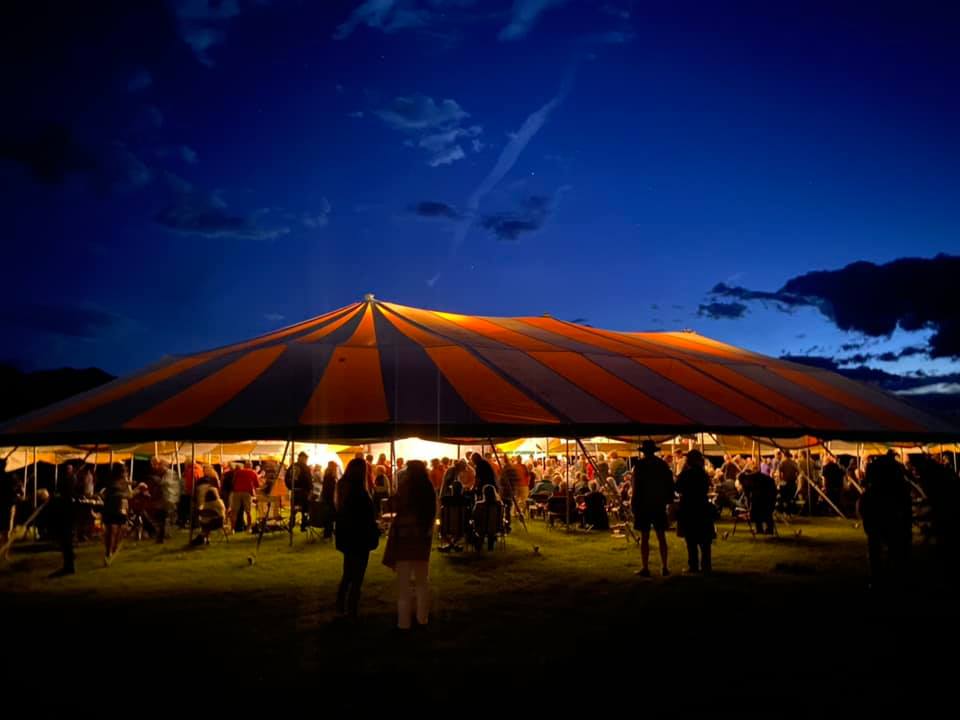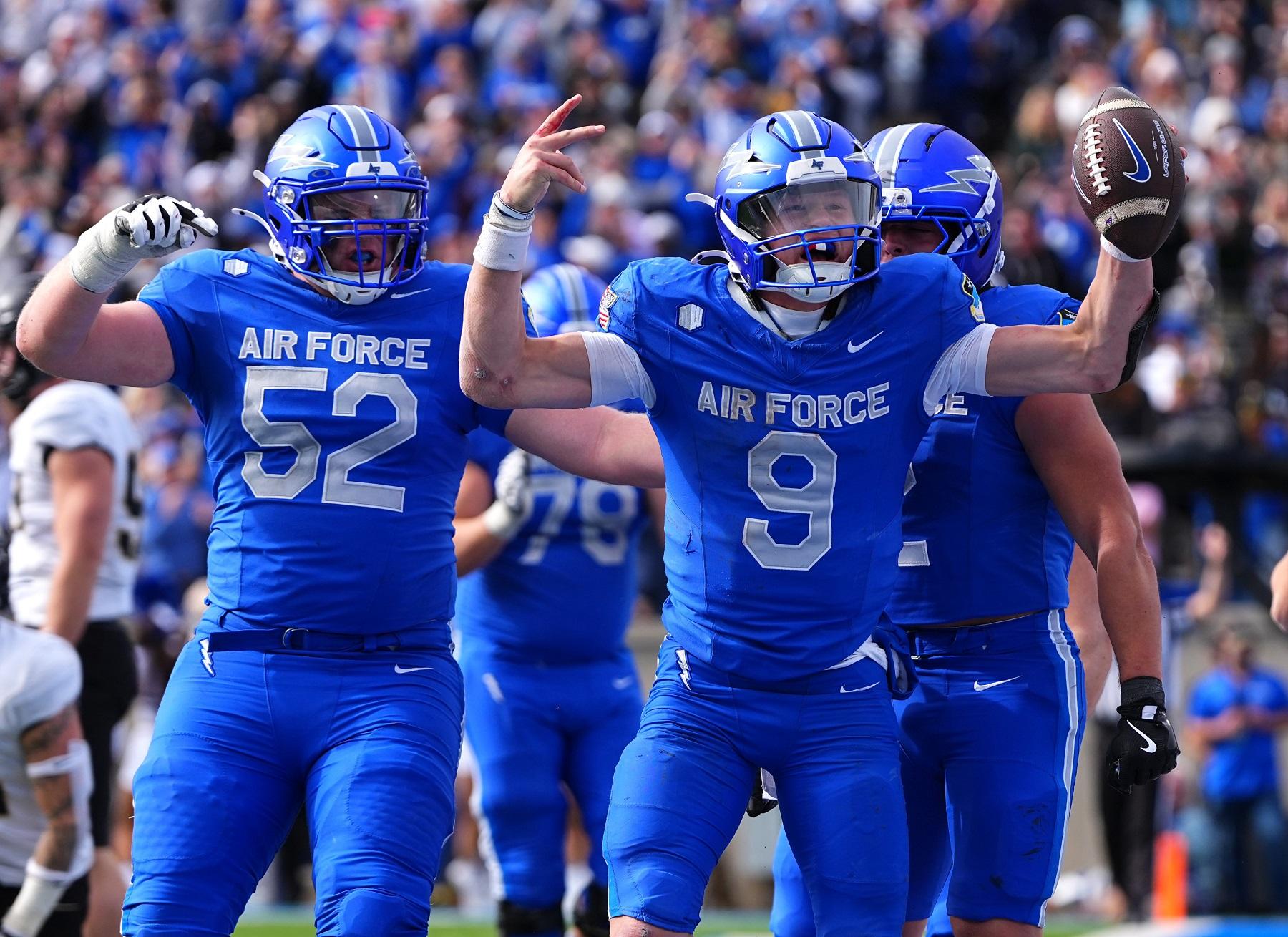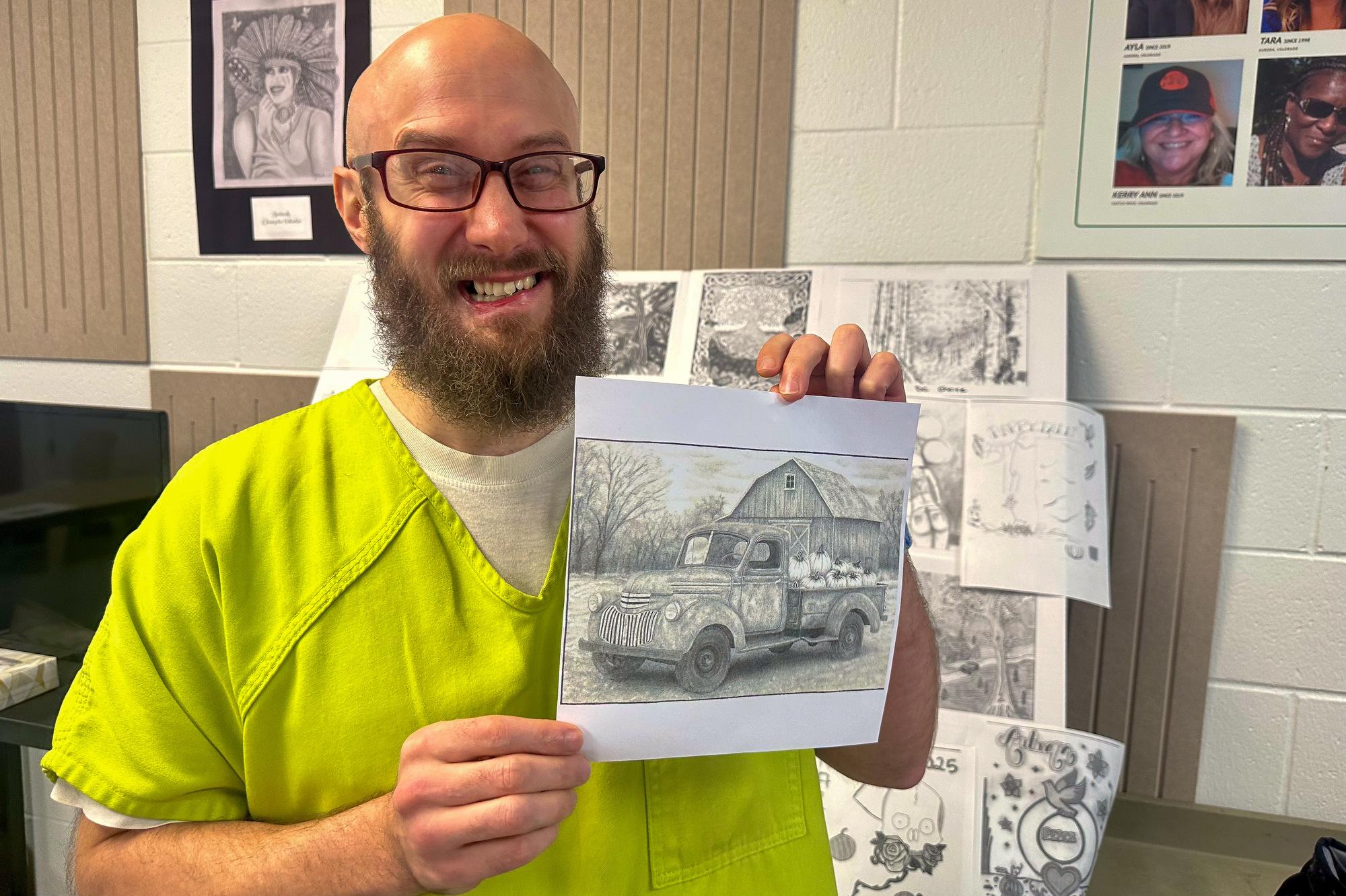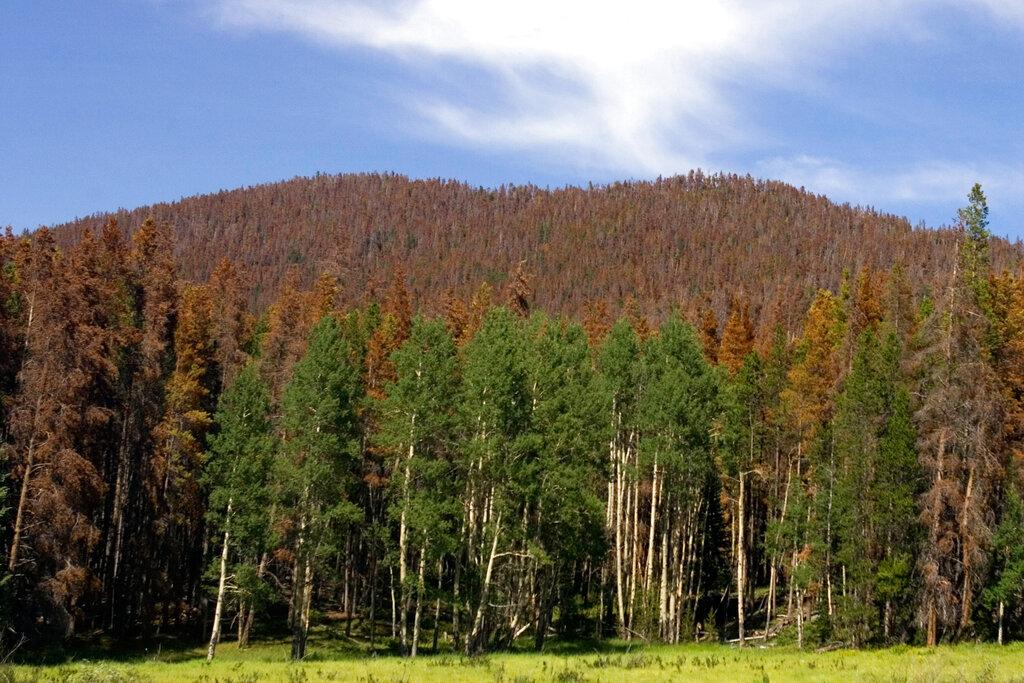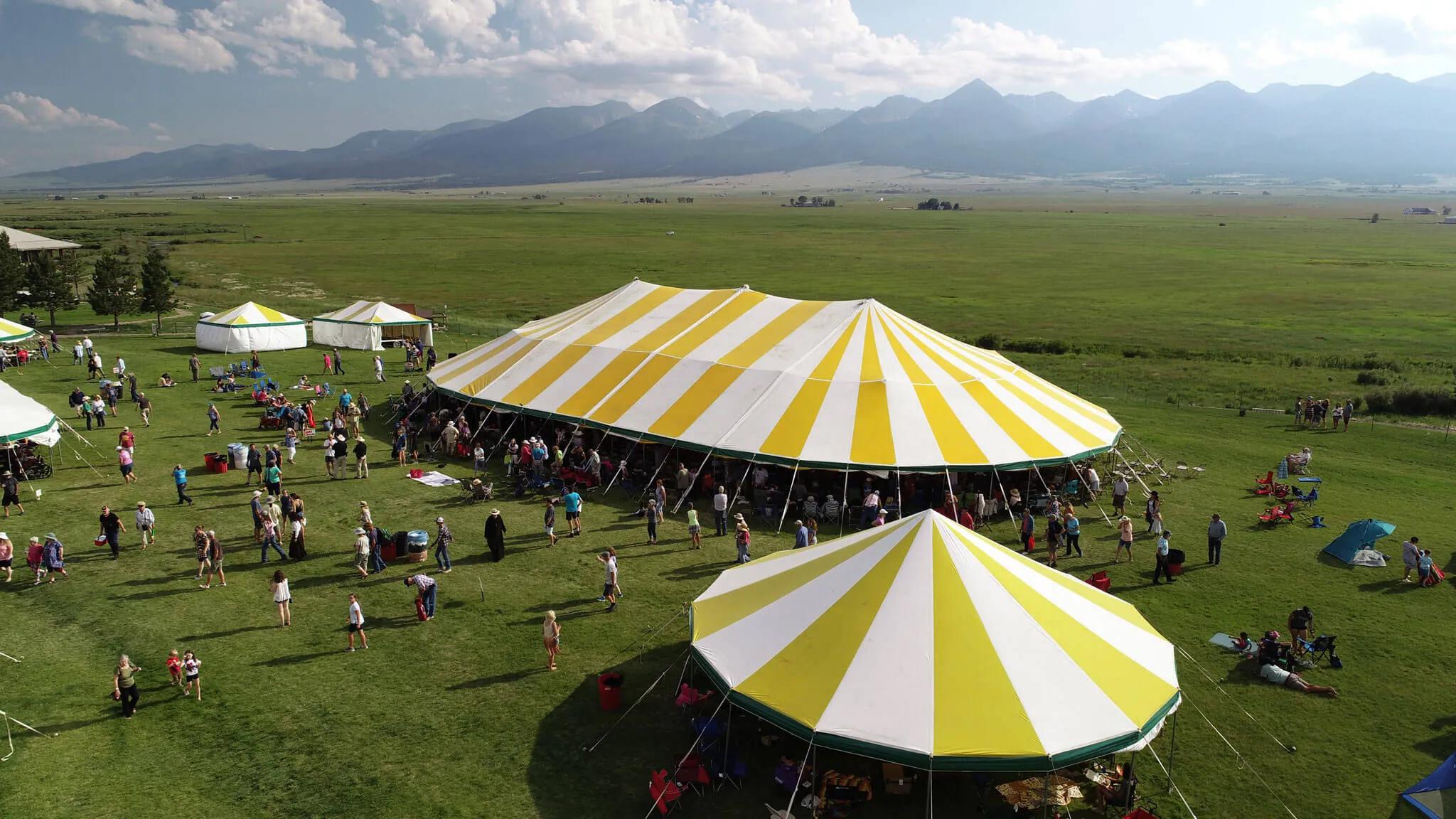
Update Friday, Sept. 27: The International Bluegrass Music Association announced yesterday that the Industrial Strength Bluegrass Festival in Wilmington, Ohio won the 2024 event of the year award over four other nominees, including High Mountain Hay Fever in Westcliffe. The headline has been changed to reflect this update.
For more than two decades, banjo players, fiddlers and other musicians have gathered annually under a giant tent at the end of Main Street in Westcliffe. Those performances draw thousands of people to the tiny ranching community for the High Mountain Hay Fever Bluegrass Festival on a long weekend in July each year.
Bluegrass bands of all styles from traditional to progressive, along with old-time and folk music performers, and even storytellers and others who might not fit easily into any category have stepped onto the festival stage.
Now High Mountain Hay Fever is a finalist for the International Bluegrass Music Association's event of the year award. The winner will be announced Thursday, Sept.26.
KRCC’s Shanna Lewis spoke with festival founder and musician Ron Thomason and his partner – old time fiddler Heidi Clare at their home in the Wet Mountain Valley.
This interview has been edited for length and clarity.
Shanna Lewis/KRCC: The festival has such an evocative name. What's the setting like?
Ron Thomason: Well, I can only compare it to the Grand Canyon and the poor Grand Canyon can't quite look as good as the Sangre Cristo Mountains that are the backdrop of the High Mountain Hay Fever Bluegrass Festival. And not only those mountains, but (the festival looks straight across) the Wet Mountain Valley. The people that come to see us try to get out of the tent pretty quickly so they can see how beautiful the place is.
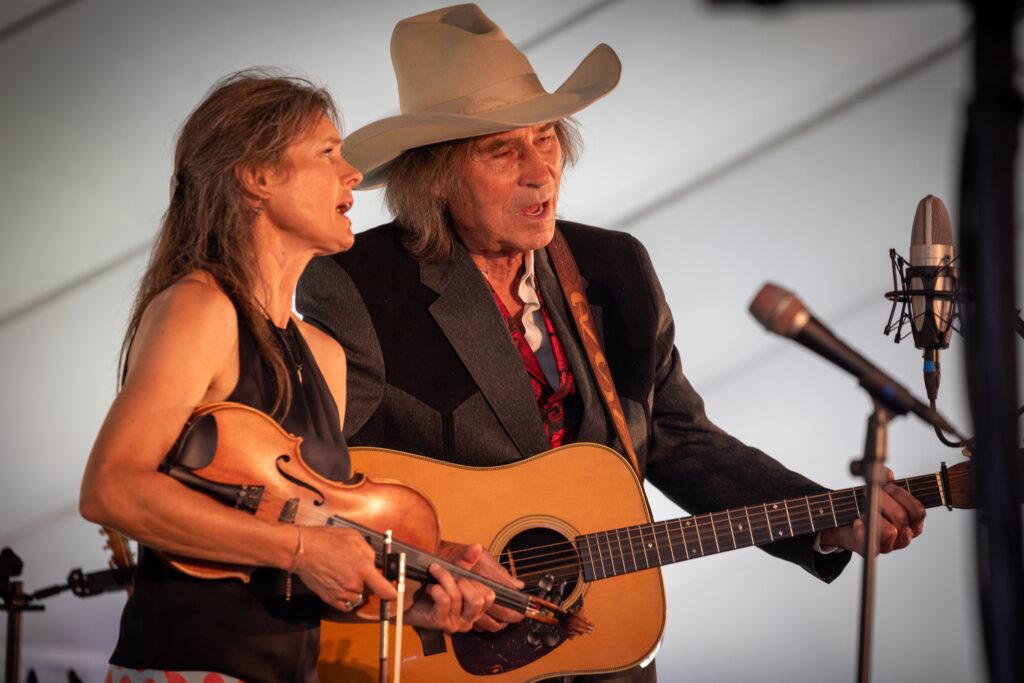
Shanna Lewis/KRCC: There must have been so many memorable performances. Tell us about one.
Ron Thomason: Well, the second year we did the festival, my favorite fiddle player in the world, Heidi Clare, happened to be in the band that played there, the ReelTime Travelers, and that got us started off to something even better than bluegrass music.
Shanna Lewis/KRCC: And you might be a little bit biased about Heidi Claire being the most memorable performance since she's sitting right here. Is there anybody else you want to mention?
Ron Thomason: Yes. So in 1969, I became Ralph Stanley's mandolin player, and we just drove all around. It was a time when rock and roll had moved bluegrass music out of the world, and we would just go day in, day out, (earning) maybe $200 per show. And the great thing about Ralph Stanley was he didn't have any bigotry and then in Southwest Virginia, that was very rare and it made me love being on the bus. That was the same time when Ralph Stanley also got to perform for Richard Nixon and Lyndon Johnson. And finally he got to come here and he did it three times. That got us off to a good start.
Shanna Lewis/KRCC: That was in the early two thousands, right?
Ron Thomason: Yes.
Shanna Lewis/KRCC: Westcliffe is pretty small and off the beaten path. It's an hour west of Pueblo. Ron, what motivated you to start this festival here?
Ron Thomason: Well, I wish I could say I did it all by myself, but I didn't. The motivation for this festival was four families - we realized that the children in our area didn't have access to any healthcare. So four families got together and we each threw $5,000 or $10,000 in a pot, took it up to the clinic, gave it to 'em, said, let us know if you need more. And at the end of the year, they brought us back almost 80% of the money, and we didn't know what to do. We thought it would be taken. It was explained to us that people didn't want to take charity. There was a wonderful person that wanted things to work for the children, and he shot his finger out at me and he said, “well, you know how to have a Bluegrass Festival. Let's do that.”
Shanna Lewis/KRCC: Heidi, what do you find that's special about this particular festival? You've been to a lot of festivals over the years.
Heidi Clare: I think one of the very most amazing things about this festival is that while Ron brings these incredible performers here, and it's a huge job, emails and phone calls and just getting that job done, but when they come, the last thing they say when they leave is, “can we come back” every time.
Shanna Lewis/KRCC: So High Mountain Hay Fever is a nonprofit organization that's run by volunteers, Heidi, who are these folks that make the festival happen every year?
Heidi Clare:They are a group of very overqualified volunteers, but the most important thing that they have is their willingness to work and their commitment to the cause.
Shanna Lewis/KRCC: How many people does it actually take to get the festival going for the long weekend and then keeping it going for the whole long weekend?
Heidi Clare: About a hundred, when you've counted everyone who helped set up and tear down, and then also the folks that are there to do the work during the event.
Shanna Lewis/KRCC: Ron, you and your band, Dry Branch Fire Squad have been the hosts of the festival right from the very beginning. And you perform your traditional style of bluegrass on most days. But on Sunday mornings at the festival, it's time for Bluegrass Gospel. What song would you pick for someone to listen to?
Ron Thomason: The last song we always sing at High Mountain Hay Fever is called Touch the Hymn of His Garment. And that song is ancient. We learned it from a person that was ancient himself, and we get the whole audience to do it. I tell 'em what the words are and we tell 'em what the tune is. And I point out to 'em that as long as they're not singing Foggy Mountain Breakdown, they can't go wrong.
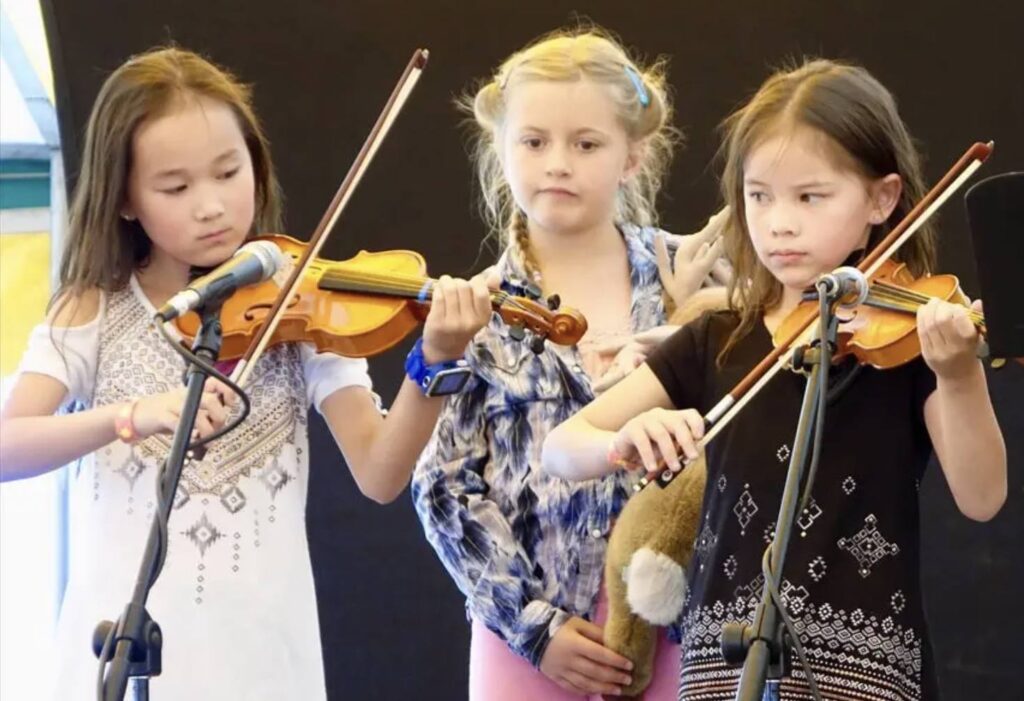
Shanna Lewis/KRCC: Something else that happens on Sundays each year is a performance by the High Mountain Hayseeds, children who've participated in workshops during the festival. Heidi, you've run a lot of these workshops for years. Why do you do this?
Heidi Clare: Oh my goodness. Because they're so cute. I founded the youth music program maybe 19 years ago. And last year I just couldn't believe how musical they were, how they took ownership. I asked them to do, of course, the music, but also the mc work. So they are responsible for the run of show. The entire show is theirs. And this last year was the first year where they finally, I think went, oh, this is really ours. We don't have to answer to anybody. We can say whatever we want. Seeing the brain lit up by music is the most beautiful thing in the world to me.
Shanna Lewis/KRCC: Do you see the same kids year after year?
Heidi Clare: Yes. It's amazing how many have come back for so many years. And so some of them have graduated to be what I call senior hayseeds. So they help run things. They help manage the little ones running around, but then we also get new ones.
Shanna Lewis/KRCC: Heidi, if you wanted to get a young person interested in old time fiddling, what would you play for them?
Heidi Clare: Probably Sally Goodin.
Shanna Lewis/KRCC: Have there been any sort of unusual or special things that have happened when these really well-known bluegrass musicians come to this tiny little place?
Ron Thomason: There was a time at the local pizza place. Bobby Osborne and his band went there to get some pizza, and nobody in the place even knew him. And they said, “what are you doing here?” And he said, "we're working at the Bluegrass Festival. They said, "Can you play a song for us? And he said, “No, I'd rather just buy a pizza. But in the end, they finally got him to stand up and sing Rocky Top.
Shanna Lewis/KRCC Ron, you've been involved in the Bluegrass Festival scene for years. What does it mean to have High Mountain Hay Fever selected as a finalist for the event of the year by the International Bluegrass Music Association?
Ron Thomason: The International Bluegrass Music Association is quite a big thing now. I'm an old man and I wish I could answer that for you. But the basic thing is we here in the mountains are very proud of what we're doing. The money always goes to things for the children, including healthcare. But also a couple years ago we started with mental and dental and we try to make sure everybody's getting a meal sometime.
